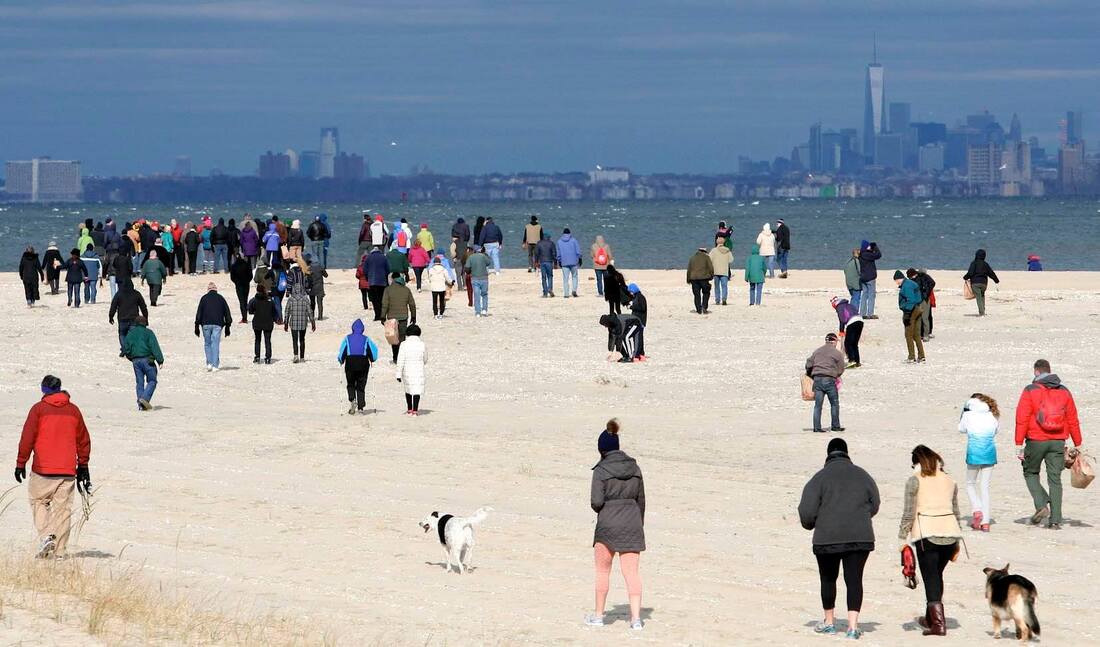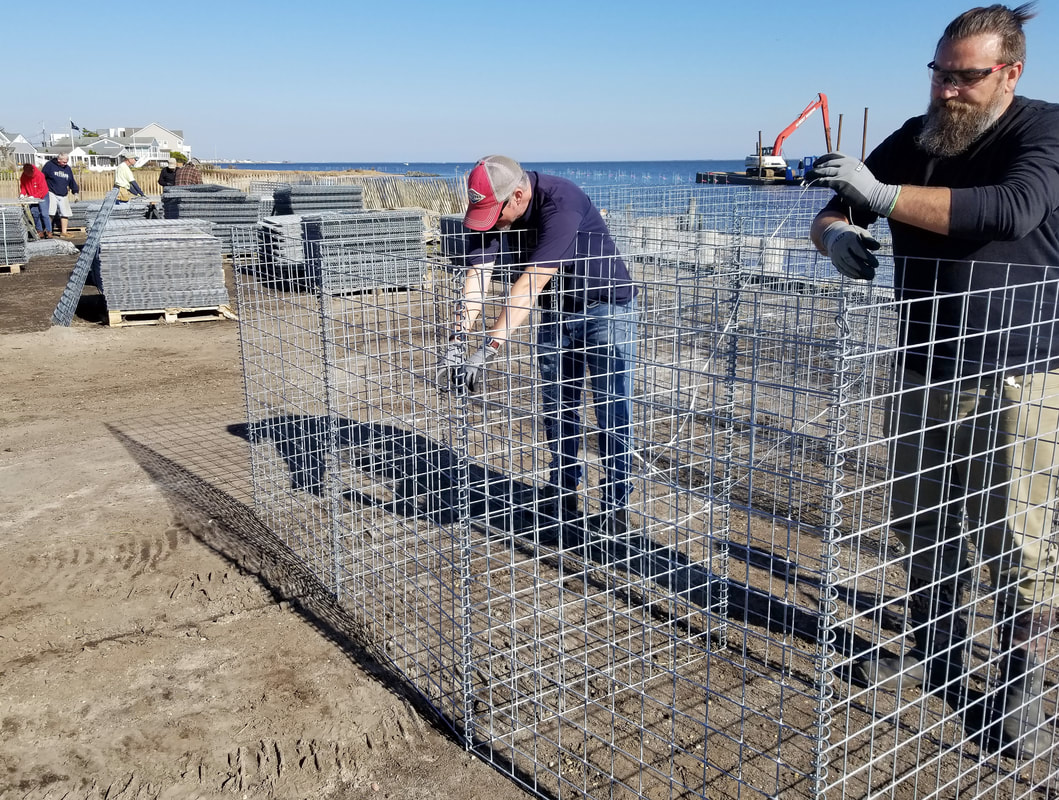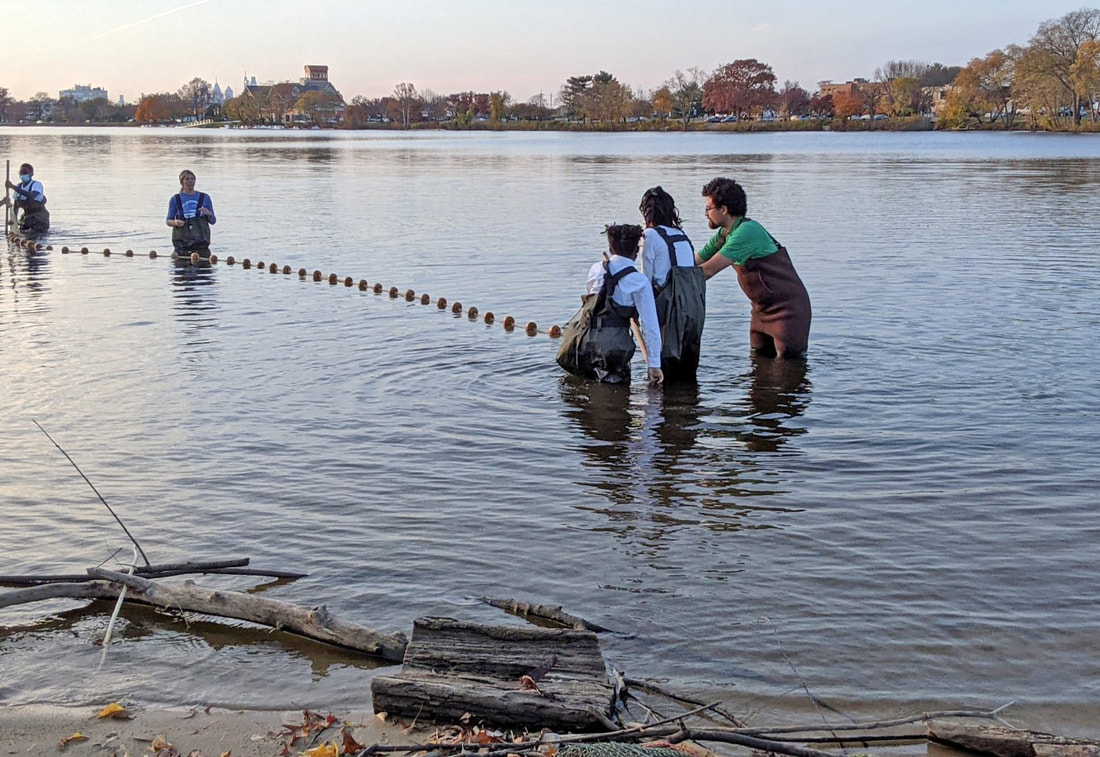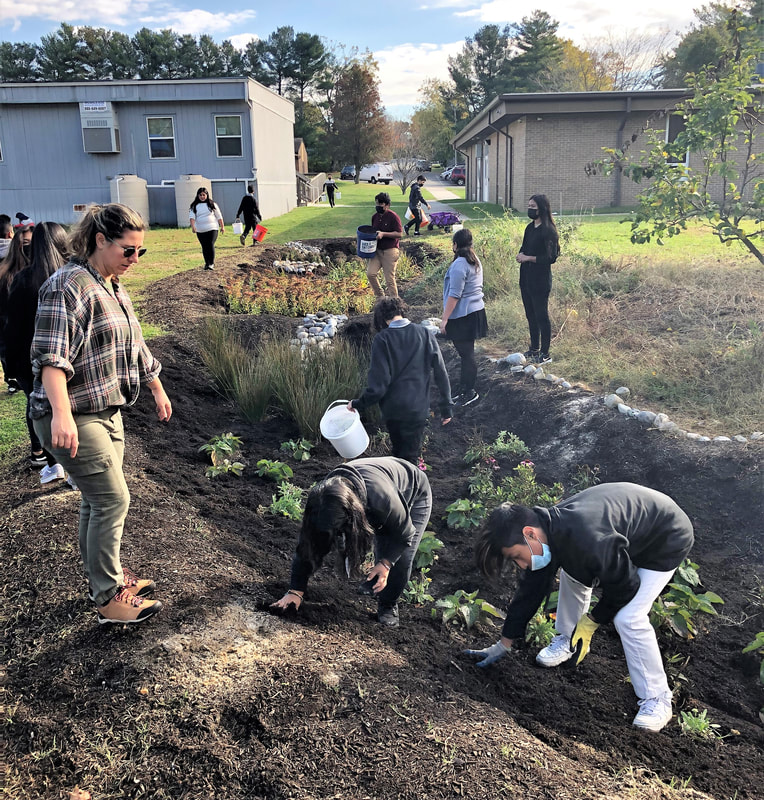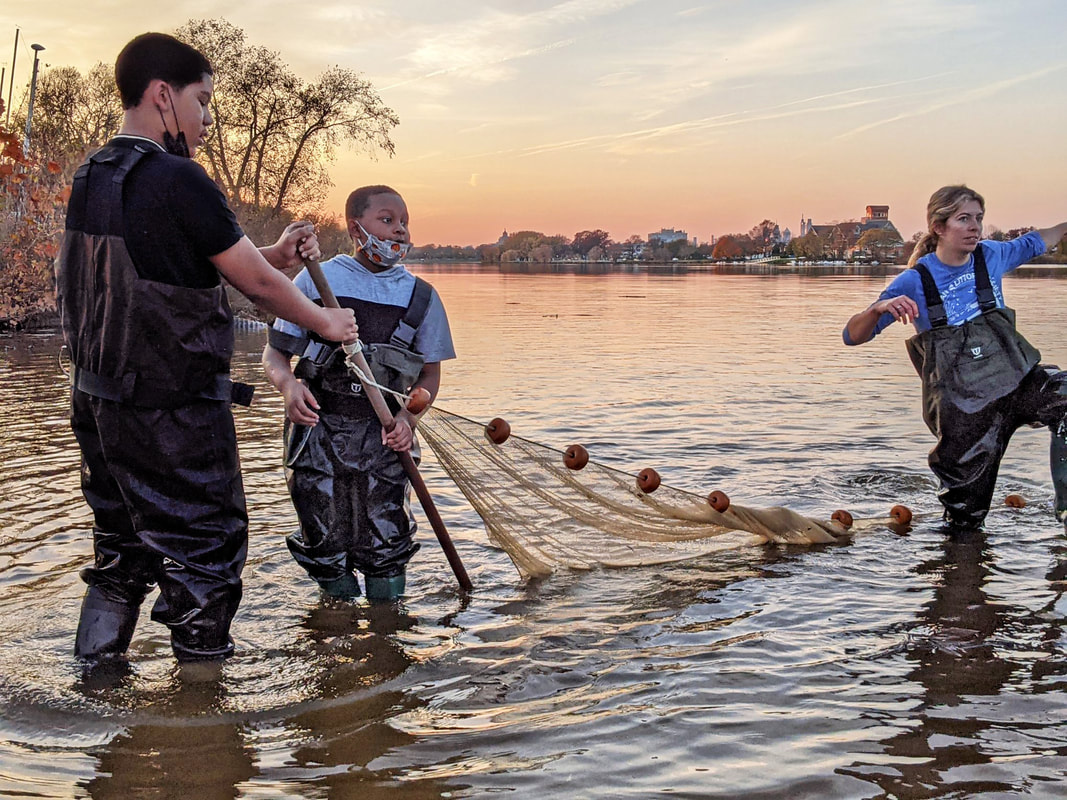 "Mickey" Maxwell Cohen "Mickey" Maxwell Cohen "Mickey" Maxwell Cohen, born in Brooklyn’s Borough Park in New York, passed away in Beverly, Massachusetts on December 28, 2021. He was 94 years old. As a youngster, Mickey developed an interest in wildlife. His mother admonished him for using her favorite pot to prepare an animal skeleton for a school project. The family still has the skeleton and the pot. Mickey met Barbara, the love of his life, as summer camp counselors. Married for 69 years, they were best friends and shared many interests. An educator, naturalist, environmentalist, civil rights activist and intellectual, Mickey was also expert in antique restoration, ornithology, marine life, and foraging wild foods. Ring in the New Year with a walk on the beach. Join the American Littoral Society at Sandy Hook, NJ or Ft. Tilden, NY on January 1 at 11 a.m.
The walks are free and suitable for anyone able to walk a few miles, with part of that distance being on sandy beaches. Leashed dogs are welcome. Dress for the weather and bring your own water. Be aware of National Park Service Covid restrictions, as both walks take place inside Gateway National Recreation Area units. Click read more to find more info and registration links for each walk. Work on the Forked River Beach project has been underway for a few weeks and folks may be wondering what is next. Through this project we are advancing our goals of restoring oysters to the waters of Barnegat Bay and developing nature-based approaches to community resilience in response to climate change impacts along our coast.
The answer is shell, of course. But before we get into that, let's recap. The work at Forked River Beach finally got underway in early November with the delivery of materials for constructing the containers that will fill seven, 200-foot long, double-rowed oyster reef segments. Called HESCOs, these large, galvanized wire baskets had to be put together before being carried by barge to the reef site and filled with stone to anchor them in the locations staked out by Stockton University. For this project, each HESCO unit/reef segment will consist of three connected galvanized steel baskets surrounded by eight outer pockets (aka shell faces). The interior baskets will be filled with rock, while the outer shell faces will be filled with a mix of recycled shell. 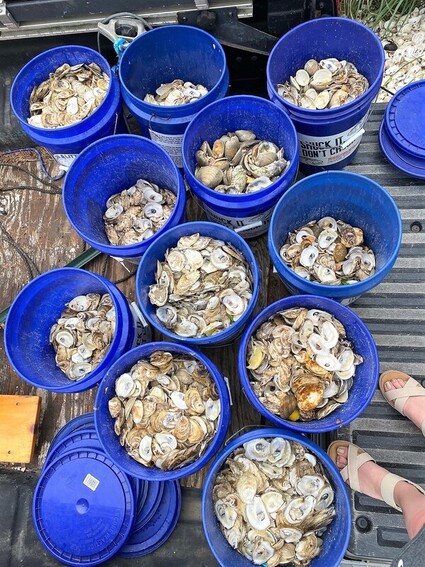 Thanks to a grant from the National Oceanic and Atmospheric Administration (NOAA), the Littoral Society's Shuck It, Don't Chuck It! program is expanding in a big way. We are starting a new, exciting partnership with the Barnegat Oyster Collective – itself a partnership among oyster aquaculture farmers – to connect local oyster growers with regional restaurants and the public. Our goal is to connect a local, growing, sustainable industry with estuarine restoration and conservation – a double win for local businesses and oysters! We will be working together to raise awareness among area residents and local restaurants on the importance of eating locally grown oysters – supporting their neighborhood businesses - AND recycling the shells back into the waterways they came from rather than dumping them into a landfill. In the coming year we will bring on a Program Coordinator, who will enable us to recycle more shell from the two rivers area of Monmouth County, while also helping to expand our efforts to interact with communities and provide information on the program. The Society will also be purchasing a van to transport all of our recycled shell, so keep an eye out for our distinctive yellow and blue logo driving around the region! How can we make the Delaware River “S.A.F.E.” for residents in Camden, Chester, Philadelphia, and Wilmington? By helping our children and our leaders get to know and care for their part of the river.
S.A.F.E. stands for Swimmable, Accessible, Fishable and Equitable; the first three letters point to the major goals of the Clean Water Act passed in the 1970s. Over the last several decades, communities, advocates and scientists have banded together to clean up what was once one of the country’s most polluted rivers. Today, you not only see people picnicking along the Delaware’s shores, but also enjoying the water itself by boating, kayaking, tubing, and even jet-skiing. That last letter—E for Equitable—is a goal for the Delaware that’s been heavily neglected. Along many parts of the river’s 330 miles that stretch from the Catskills to the Delaware Bay, the water is kept safe for swimming and “primary contact,” that is, safe for direct contact with the water if someone were to fall in. The sections of the river that flow through Camden, Philly, Chester and Wilmington—areas of our region where families are the most diverse in both identity and income—don’t enjoy those same protections. 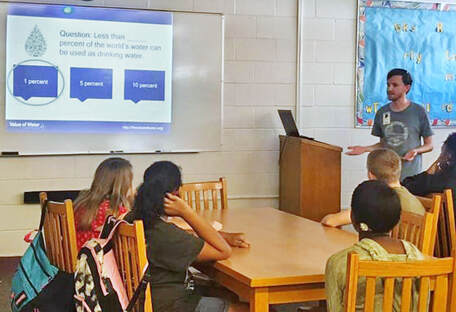 Conserving water at home has been a pillar of environmental responsibility for a very long time, but how does that relate to coastal conservation? Ask the students who participated in the American Littoral Society’s Water Champions program over the past few years. Administered through the Society’s Delaware Bayshore office in Millville, NJ, it involves students from several area schools who explore how their upstream actions could affect coastal waters and what the steps they can take to make their communities more water efficient. Freshwater conservation may seem like an odd fit for an organization like the Littoral Society, which is focused on caring for the coast. But there are some key connections. One of the connections involves ensuring sustainable sources of drinking water for humans. 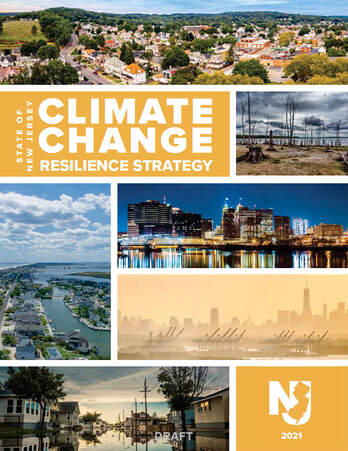 As the world’s nations debate and negotiate desperately needed responses to climate change, here in New Jersey, the Murphy Administration is moving forward on a plan to respond to the climate induced challenges we already face. Called “The State of New Jersey Climate Change Resilience Strategy,” the proposed plan aims to promote policies and strategies that recognize “New Jersey’s vulnerability to climate change cannot wait.” Challenges the state will face include sea level rise; increased storms, heat and rainfall; and the loss and reshaping of habitats and coastlines throughout the state. The resilience plan is complex and offers a series of interdependent responses to differing climate change impacts. It includes the results of surveys of the public asking about their top 6 concerns, as well as the actions and strategies they would like to see implemented by the state. The plan is upfront about the seriousness of climate change. It acknowledges: “New Jersey remains one of the most vulnerable states in the nation to damage from sea-level rise, storm surge, more frequent and intense precipitation, erosion and other climate impacts. 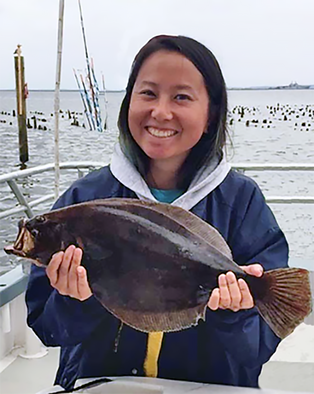 Join us in welcoming Emily McGuckin as the new American Littoral Society Fish Tagging Program Director. A 2018 graduate of Stockton University, Emily earned a degree in Marine Science, with a minor in Environmental Science. Immediately after graduating, she went on to become a Fish Tagging Intern, working with Jeff Dement, the Littoral Society's former Fish Tagging Director. After the internship, she continued to volunteer with the Fish Tagging Program over the years. When Jeff Dement passed away in January 2021, she stepped into his role as a volunteer and continued to help with the program until officially hired to the Fish Tagging Director’s position in September 2021. Emily is really looking forward to improving on Jeff’s already amazing program and hopes to help the program grow scientifically as well as through membership. She really loves marine ecosystems and thinks it important to keep updating our scientific knowledge of fisheries, especially now, knowing that sea temperatures are changing. Understanding how different fisheries are doing along the East Coast helps the program advocate for issues important to the recreational fishing community and for the fish themselves. She is always interested in any ideas someone might have to improve the program. If you'd like to become a fish tagging member or receive more information about the program, please email Emily at [email protected]. After being mulched and planted, the rain gardens at Bridgeton’s Indian Avenue School are now working to improve water quality in the Delaware Bay.
The American Littoral Society was joined recently by several classes of students from Mr. Vena’s 8th grade and 6th grade classes. Over the course of two days, the students worked hard to fill the six gardens with native plants and cover them with mulch. The garden sites were dug out by the Littoral Society Restoration Corps interns over the summer. How do rain gardens off Jackson Run – a Cohansey River tributary – connect to the health of the Delaware Bay? It’s all about stormwater runoff from impervious surfaces and the interconnection of the whole watershed. Green stormwater infrastructure, such as rain gardens, encourages rainwater to flow into the aquifer rather than running off sealed surfaces like parking lots into our rivers and streams, which lead to the bay. It’s healthier for the water to slowly percolate into the soil, which filters out pollutants. Besides keeping pollution out of the bay, the rain gardens also help slowly replenish the local aquifer – which provides drinking water to people living in the area. What did your kids do at school this week?
If you were a 6th or 7th grader at UrbanPromise you would have been knee deep in the Cooper River Lake! As part of our environmental education focus, UrbanPromise has teamed up with American Littoral Society for their SeaQuest program, a 6-week course focusing on the coastlines and the organisms that live there. As part of that, students took part in a fish survey on Cooper River Lake, which involved using a seine net to collect fish and examined them. Students then discussed their observations of the fish and if they thought their environment and living conditions were healthy. |
Archives
July 2024
Categories
All
|

